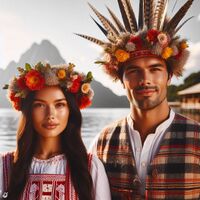Thračicians: Difference between revisions
m (Removed redirect to Sydona#Ethnic groups) Tag: Removed redirect |
m (→Tehoe) Tag: 2017 source edit |
||
| (4 intermediate revisions by 2 users not shown) | |||
| Line 1: | Line 1: | ||
[[File:900px chequered white HEX-2945AA.svg|thumb|The flag of the Thračician people]] | [[File:900px chequered white HEX-2945AA.svg|thumb|The flag of the Thračician people]] | ||
'''Thračicians | '''Thračicians''', also known as '''Thrakoslavs''' or '''Sea Slavs''' are an ethnic group native the the coasts and islands of southeastern [[Sarpedon]], with their ethnic homeland centred on the [[West Yerduran Autonomous Division]] in [[Sydona]]. They have a far-flung global diaspora reflecting their extensive martitime, mercantile, and mercenary history. | ||
==Great Prince's Own Royal Thračician Foot Guard == | |||
{{Further|Great Prince's Own Royal Thračician Foot Guard}} | |||
The Great Prince's Own Royal Thračician Foot Guard is an ethnic [[Thračician]] Guard demi-regiment in the direct service of the [[Government of Burgundie#Executive Branch|Great Prince]] of [[Burgundie]]. The Guard is a non-mechanized infantry demi-regiment tasked with the protection of the Great Prince, his family and possessions. | |||
==Tehoe== | |||
[[File:Tehoe people.jpg|200px|right]] | |||
{{Further|Sudmoll#Demographics}} | |||
Tehoe (Æng. The bond, or the covenant) are a Thračician-Polynesian creole culture who live on the [[Burgundie|Burgoignesc]] island of [[Sudmoll]] in the [[Peratra]] subcontinent. They the Thračicians served in the fleets of the [[Duchy of Bourgondi]] for much of the 17th-19th centuries and were rewarded for their service with small [[Patroon]]ships in [[Sudmoll]]. These Thračician [[patroon]]s begat with the local Polynesian women of the island and by the 1780s there was a strong Tehoe culture emerging. Because of the nature of their work, the men were often away at sea so they were not present to impart many of their Thračician customs and traditions, but some did persist. The sining of {{wp|Bećarac}} is immensely popular in both the native Thračician language and also those translated or written in the [[Burgoignesc language]]. During observations of patriotism some Thračicians wear elements of the {{wp|Croatian national costume|Thračician national costume}} with influences from their native Polynesian culture. | |||
[[Category:Peoples of the Burgoignesc Thalattocracy]] | |||
[[Category:Ethnic groups]] | [[Category:Ethnic groups]] | ||
[[Category:KRV]] | |||
[[Category:IXWB]] | |||
Latest revision as of 22:11, 21 January 2024
Thračicians, also known as Thrakoslavs or Sea Slavs are an ethnic group native the the coasts and islands of southeastern Sarpedon, with their ethnic homeland centred on the West Yerduran Autonomous Division in Sydona. They have a far-flung global diaspora reflecting their extensive martitime, mercantile, and mercenary history.
Great Prince's Own Royal Thračician Foot Guard
The Great Prince's Own Royal Thračician Foot Guard is an ethnic Thračician Guard demi-regiment in the direct service of the Great Prince of Burgundie. The Guard is a non-mechanized infantry demi-regiment tasked with the protection of the Great Prince, his family and possessions.
Tehoe

Tehoe (Æng. The bond, or the covenant) are a Thračician-Polynesian creole culture who live on the Burgoignesc island of Sudmoll in the Peratra subcontinent. They the Thračicians served in the fleets of the Duchy of Bourgondi for much of the 17th-19th centuries and were rewarded for their service with small Patroonships in Sudmoll. These Thračician patroons begat with the local Polynesian women of the island and by the 1780s there was a strong Tehoe culture emerging. Because of the nature of their work, the men were often away at sea so they were not present to impart many of their Thračician customs and traditions, but some did persist. The sining of Bećarac is immensely popular in both the native Thračician language and also those translated or written in the Burgoignesc language. During observations of patriotism some Thračicians wear elements of the Thračician national costume with influences from their native Polynesian culture.